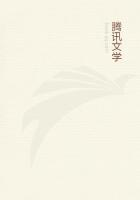Quintessence of worldliness, Mrs. Mountstuart appeared through his farthest window, swinging her skirts on a turn at the end of the lawn, with Horace De Craye smirking beside her. And the woman's vaunted penetration was unable to detect the histrionic Irishism of the fellow. Or she liked him for his acting and nonsense; nor she only. The voluble beast was created to snare women. Willoughby became smitten with an adoration of stedfastness in women. The incarnation of that divine quality crossed his eyes. She was clad in beauty. A horrible nondescript convulsion composed of yawn and groan drove him to his instruments, to avert a renewal of the shock; and while arranging and fixing them for their unwonted task, he compared himself advantageously with men like Vernon and De Craye, and others of the county, his fellows in the hunting-field and on the Magistrate's bench, who neither understood nor cared for solid work, beneficial practical work, the work of Science.
He was obliged to relinquish it: his hand shook.
"Experiments will not advance much at this rate," he said, casting the noxious retardation on his enemies.
It was not to be contested that he must speak with Mrs Mountstuart, however he might shrink from the trial of his facial muscles. Her not coming to him seemed ominous: nor was her behaviour at the luncheon-table quite obscure. She had evidently instigated the gentlemen to cross and counterchatter Lady Busshe and Lady Culmer. For what purpose?
Clara's features gave the answer.
They were implacable. And he could be the same.
In the solitude of his room he cried right out: "I swear it, I will never yield her to Horace De Craye! She shall feel some of my torments, and try to get the better of them by knowing she deserves them." He had spoken it, and it was an oath upon the record.
Desire to do her intolerable hurt became an ecstasy in his veins, and produced another stretching fit that terminated in a violent shake of the body and limbs; during which he was a spectacle for Mrs. Mountstuart at one of the windows. He laughed as he went to her, saying: "No, no work to-day; it won't be done, positively refuses."
"I am taking the Professor away," said she; "he is fidgety about the cold he caught."
Sir Willoughby stepped out to her. "I was trying at a bit of work for an hour, not to be idle all day."
"You work in that den of yours every clay?
"Never less than an hour, if I can snatch it."
"It is a wonderful resource!"
The remark set him throbbing and thinking that a prolongation of his crisis exposed him to the approaches of some organic malady, possibly heart-disease.
"A habit," he said. "In there I throw off the world."
"We shall see some results in due time."
"I promise none: I like to be abreast of the real knowledge of my day, that is all."
"And a pearl among country gentlemen!"
"In your gracious consideration, my dear lady. Generally speaking, it would be more advisable to become a chatterer and keep an anecdotal note-book. I could not do it, simply because I could not live with my own emptiness for the sake of ****** an occasional display of fireworks. I aim at solidity. It is a narrow aim, no doubt; not much appreciated."
"Laetitia Dale appreciates it."
A smile of enforced ruefulness, like a leaf curling in heat, wrinkled his mouth.
Why did she not speak of her conversation with Clara?
"Have they caught Crossjay?" he said.
"Apparently they are giving chase to him."
The likelihood was, that Clara had been overcome by timidity.
"Must you leave us?"
"I think it prudent to take Professor Crooklyn away."
"He still . . .?"
"The extraordinary resemblance!"
"A word aside to Dr. Middleton will dispel that."
"You are thoroughly good."
This hateful encomium of commiseration transfixed him. Then she knew of his calamity!
"Philosophical," he said, "would be the proper term, I think."
"Colonel De Craye, by the way, promises me a visit when he leaves you."
"To-morrow?"
"The earlier the better. He is too captivating; he is delightful.
He won me in five minutes. I don't accuse him. Nature gifted him to cast the spell. We are weak women, Sir Willoughby."
She knew!
"Like to like: the witty to the witty, ma'am."
"You won't compliment me with a little bit of jealousy?"
"I forbear from complimenting him."
"Be philosophical, of course, if you have the philosophy."
"I pretend to it. Probably I suppose myself to succeed because I have no great requirement of it; I cannot say. We are riddles to ourselves."
Mrs. Mountstuart pricked the turf with the point of her parasol.
She looked down and she looked up.
"Well?" said he to her eyes.
"Well, and where is Laetitia Dale?"
He turned about to show his face elsewhere.
When he fronted her again, she looked very fixedly, and set her head shaking.
"It will not do, my dear Sir Willoughby!"
"What?"
I never could solve enigmas."
"Playing ta-ta-ta-ta ad infinitum, then. Things have gone far. All parties would be happier for an excursion. Send her home."
"Laetitia? I can't part with her."
Mrs. Mountstuart put a tooth on her under lip as her head renewed its brushing negative.
"In what way can it be hurtful that she should be here, ma'am?" he ventured to persist.
"Think."
"She is proof."
"Twice!"
The word was big artillery. He tried the affectation of a staring stupidity. She might have seen his heart thump, and he quitted the mask for an agreeable grimace.
"She is inaccessible. She is my friend. I guarantee her, on my honour. Have no fear for her. I beg you to have confidence in me.
I would perish rather. No soul on earth is to be compared with her."
Mrs. Mountstuart repeated "Twice!"
The low monosyllable, musically spoken in the same tone of warning of a gentle ghost, rolled a thunder that maddened him, but he dared not take it up to fight against it on plain terms.
"Is it for my sake?" he said.
"It will not do, Sir Willoughby."
She spurred him to a frenzy.














